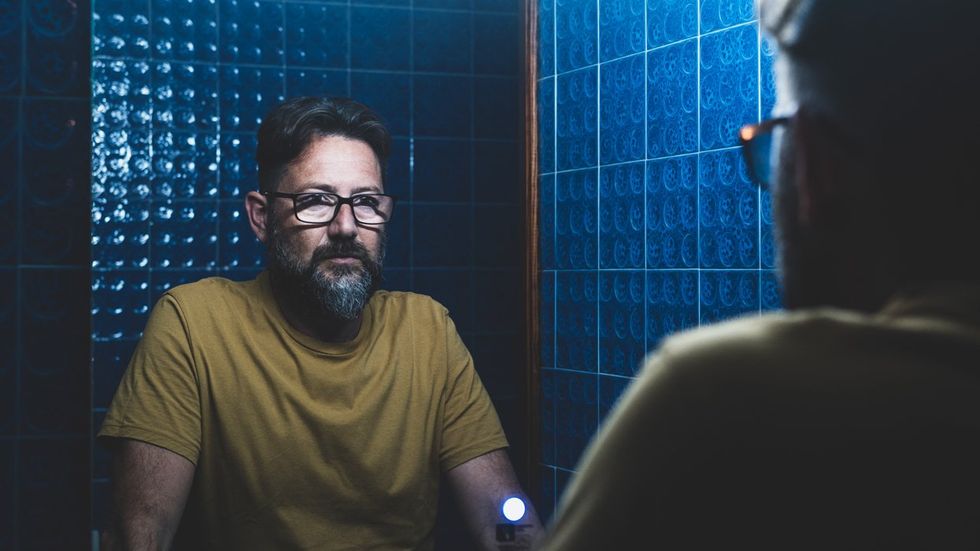
WWW.OUT.COM
Body dysmorphia is a gay crisis. Here's how one filmmaker is fighting it
Every day, we wake up and look at ourselves in the mirror. While many of us are content with our reflections, there are those who only see an endless checklist of flaws that need fixing. Whether its pesky belly fat that never seems to go away or a larger-than-average nose, experiencing some dissatisfaction with your body is a normal thing.While some people are capable of accepting their physique without becoming overly self-conscious, there are those who develop lifelong obsessions with what they perceive as their flaws, which trigger an endless need to achieve the perfect body. This is known as body dysmorphic disorder, a mental health condition in which a person becomes obsessed with imaginary defects in their appearance. Filmmaker Nick Demos has struggled with this since he was a young boy.Demos has made a conversation-starting film about his personal struggles called Body Electric, a documentary that examines not only the countless types of BDD that are out there and the trauma it sometimes stems from, but also the unhealthy impact its had within the LGBTQ+ community. Some of his interviewees subject themselves to shocking extremes in pursuit of physical perfection. And Demos, like many of his brave subjects, holds nothing back, sharing some raw, emotionally charged experiences of his own. After all, Body Electric is ultimately his story, and the idea for the project sparked from casual conversations about aging he had among his close circle of friends. Right before my 45th birthday, I was chatting with friends about what it means to age, because our bodies are changing, Demos says. I read a statistic that said 42 percent of men who binge eat with eating disorders are gay despite being only 5 percent of the population. And after I read that, there were conversations I was having with my friends. You know, theres this sort of teasing about your body, or there were these conversations where we would go much deeper about it. And I was like, Oh, theres this massive juxtaposition here. And when I read that statistic, I was like, Ive got to make this film.The brow-raising statistic about gay men with eating disorders wasnt the only surprising data Demos came across while making his film. Throughout its 75-minute runtime, Body Electric drops a handful of other alarming statistics. But there was one that stood out to him the most. I think the one that really blew me away was that 10 percent of gay men would agree to die 11 years earlier for an ideal body. Now, I was like, youre going to cut off 10 or 11 years of your life to have a better body right now? That was shocking to me.Body Electric features on-camera testimonials, not only from Demoss close friends but a wide variety of LGBTQ+ people who are coping with aging and BDD in their own way. A transgender subject shares their nightmarish plastic surgery stories, elder gay men reveal the effects the AIDS crisis on gym culture, and gay millennials talk about bullying within the community and the impact that social media and thirst-trap imagery has on the body (one gay 20-something refers to age 30 as gay death). Fitness models, trainers, and other professionals also weigh in on the competitive nature among gay men, the prevalence of steroids, eating disorders, and how so many torture themselves at the gym to achieve that Adonis physique. While some of these interviews might leave ones mouth agape, Demos made it his mission to round up authentic stories from people who were brave enough to open up about such personal topics on camera. TheNickDemos Our relationship with our body is such a human experience, says Demos. We didnt want it to be sensational in any way, and it was really, really important to me that everyone in the film is deeply human, flawed, real, honest, and that we didnt want it to be like a reality TV show or like a super-sensationalized look at the freaks. That was not what we were interested in. So we did hire a casting director for the extremes, but we made it very, very clear that they had to be people that were willing to truly open up, to truly tell their story and not be there for fortune or fame.Also sharing their personal anecdotes and thought-provoking observations throughout Body Electric were a few queer comedians, including Bruce Vilanch, Judy Gold, and the late Leslie Jordan. In addition to humor, they had their own insights to share.One of the reasons I brought [Bruce Vilanch] in with Judy Gold and the other comedians is because I knew that this subject matter was so heavy and so dense that we needed some levity, reveals Demos. Thats why I went to some comedians, but I also asked them real questions about their bodies as well, to show that range of the human experience, and that, yes, we can laugh at it, but we can also point out the realness.Some of the realness especially got to Jordan, who spends a great deal of his on-camera time sharing wise words and his many poignant views on what his generation went through to help pave the way for the many basic rights that younger gays might take for granted today.He was incredible, says Demos of Jordan. At the end of my interview with him, I made him cry. He goes, Do you know who you are? Youre Goprah. Youre the gay Oprah.After sifting through thousands of hours of footage which he filmed between the span of ages 45 to 50 Demos underwent what he calls a tricky two years of editing and settled on a 75-minute cut that not only told his story but intertwined those of his many interview subjects stories that helped him heal during his own body-acceptance journey. This was like a massive healing journey for me, personally. Massive, shares Demos. Looking at yourself every day for that long and that many times, you cant help but learn from each of those characters who you are.I learned more acceptance of who I am beyond the skin, who I am as a human being walking this planet. And a little more body acceptance, honestly, he adds. You know, people are like, Oh, is everything cured and healed? Im like, No, Im a human. Am I as obsessed with what Im eating every day? No, that I will say.During the opening of Body Electric, Demos talks about how he hopes his film will help make a difference. Does he feel hes achieved that goal?Every day, Im getting an email, a DM, or people that I dont know calling me. Ive had two therapists reach out to have conversations with them to help their clients, he reveals. Like, when I said I wanted to help in some way, I knew it was to open the conversation, and thats really what the film is about. Its like, if we can actually start talking about this in a deep way beyond the teasing that we do with each other, beyond the looking up and down of each other like if we can actually open the conversation a bit. And thats whats happening. That I am most proud of, for sure.For those young gay people who are suffering from body dysmorphia right now, Demos has one piece of advice.Get help earlier, start talking about it now in any way with whoever will listen to you that you trust, in any way, shape, or form, go to them. I wish that I had, he urges. I began working on my dysmorphia and the abuse and all of that in my 30s mid to late 30s, really and I wish that I had done it earlier, but I didnt feel like I could. And Im here to let you know that you can.Body Electric is now available to rent on Prime Video. Body dysmorphia disproportionately affects gay men.The Body Electric Body dysmorphia statistics in relation to the LGBTQ+ community.OUT Sept-Oct 2025 print issue This article is part of Out's Sept-Oct issue, which hits newsstands August 26. Support queer media and subscribe or download the issue through Apple News, Zinio, Nook, or PressReader starting August 14.
0 Comments
0 Shares
105 Views
0 Reviews



